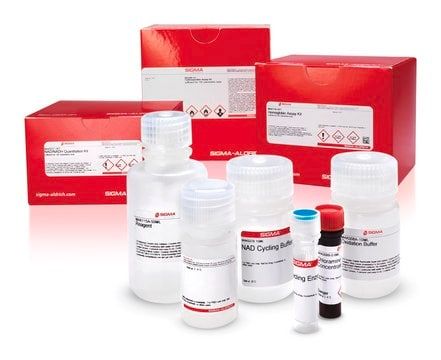MAK333
Citrate Assay Kit
sufficient for 100 colorimetric or fluorometric tests
Manufacturer: Sigma Aldrich
Synonym(S): Citric Acid Test Kit
Select a Size
| Pack Size | SKU | Availability | Price |
|---|---|---|---|
| 1 KIT | MAK333-1-KIT | In Stock | ₹ 43,745.10 |
MAK333 - 1 KIT
In Stock
Quantity
1
Base Price: ₹ 43,745.10
GST (18%): ₹ 7,874.118
Total Price: ₹ 51,619.218
usage
sufficient for 100 colorimetric or fluorometric tests
input
culture(s) plasma tissue serum urine
detection method
colorimetricfluorometric
relevant disease(s)
cancer
storage temp.
−20°C
Description
- General description: Citrate is an intermediate in the citric acid cycle and is involved in fatty acid synthesis. The Citrate Assay Kit provides a simple, and automation-ready procedure for measuring citrate concentration. Citrate is converted into pyruvate which is then oxidized with the conversion of the dye into a colored and fluorescent form. The color intensity at 570 nm or fluorescence intensity at λex/em = 530/585 nm is directly proportional to the citrate concentration in the sample. Linear detection range: 4 to 400 μM citrate for colorimetric assays and 0.5 to 40 μM for fluorimetric assays.
- Application: The Citrate Assay Kit may be used for:Cancer ResearchDrug DiscoveryMetabolic Disorders Research
- Features and Benefits: Efficient and Precise: Detect Citrate levels ranging from 4 to 400 μM (colorimetric) and 0.5 to 40 μM (fluorimetric) in a 15 minute room temperature reaction, providing both convenience and sensitivity.Compatibility with High-Throughput Systems: Easily incorporate our kit into high-throughput handling systems, ensuring smooth and accurate processing, enhancing efficiency in your laboratory workflow.
- Suitability: Suitable for citrate determination in biological samples (e.g. plasma, serum, urine, tissue and culture media.)
- Principle: In this kit, citrate is converted into pyruvate which is then oxidized with the conversion of the dye into a colored and fluorescent form. The color intensity at 570 nm or fluorescence intensity at λex/em = 530/585 nm is directly proportional to the citrate concentration in the sample. Linear detection range: 4 to 400 μM citrate for colorimetric assays and 0.5 to 40 μM for fluorimetric assays.
- Other Notes: For additional information on our range of Biochemicals, please complete this form.
SAFETY INFORMATION
WGK
WGK 3
